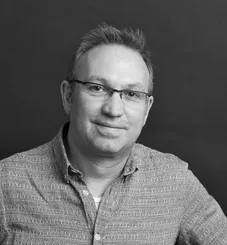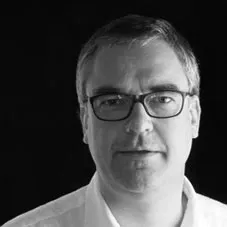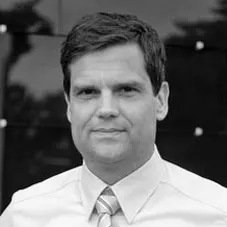Prof. Dipl.-Ing. Thomas Auer (TUM), Prof. Dr.-Ing. Jens Schneider (TU Darmstadt), Prof. Dr.-Ing. Ulrich Knaack (TU Delft), Prof. Dr.-Ing. Linda Hildebrand (RWTH Aachen) and Prof. Dr.-Ing. Daniele Santucci (RWTH Aachen) will be hosting the PowerSKIN 2022 Conference.
It is the fourth event of a biennial series: December 8th 2022, architects, engineers, and scientists present their latest developments and research projects for public discussion and reflection. For the second time the conference will be a hybrid event, broadcasted live from Aachen.

Prof. Dipl.-Ing. Thomas Auer
Trained as a Process Engineer at the Technical University in Stuttgart, Thomas Auer is a partner and managing director of Transsolar GmbH, a German engineering firm specialized in energy efficient building design and environmental quality with offices in Stuttgart, Munich, Paris and New York. In January of 2014 he became Professor for building technology and climate responsive design at the Technical University of Munich.
Thomas Auer collaborated with world known architecture firms on numerous international design projects and competitions. A specialist in the fields of integrated building systems and energy efficiency in buildings as well as sustainable urban design, he has developed concepts for projects around the world noted for their innovative design and energy performance – an integral part of signature architecture. The office tower for Manitoba Hydro in downtown Winnipeg, Canada is considered one of the most energy efficient high-rise buildings in North America. Lower Don lands, Toronto is going to be among the first carbon neutral districts in North America.
Outside of Transsolar, Thomas Auer taught at Yale University and was a visiting professor at the ESA in Paris and other Universities. He speaks frequently at conferences and symposia. In 2010 he received the Treehugger “best of green” award as “best engineer”.

Prof. Dr.-Ing. Ulrich Knaack
Ulrich Knaack was trained as an architect at the RWTH Aachen, Germany. After earning his degree he worked at the university as researcher in the field of structural use of glass and completed his studies with a PhD.
In his professional career Ulrich Knaack worked as architect and general planner in Düsseldorf, Germany, succeeding in national and international competitions. His projects include high-rise and office buildings, commercial buildings and stadiums.
In his academic career Ulrich Knaack was professor for Design and Construction at the Hochschule OWL, Germany. He also was and still is appointed professor for Design of Construction at the Delft University of Technology / Faculty of Architecture in the Netherlands, where he developed the Façade Research Group. In parallel he is professor for Façade Technology at the TU Darmstadt / Faculty of Civil engineering, Germany, where he participates in the Institute of Structural Mechanics and Design.
Ulrich Knaack organizes interdisciplinary design workshops and symposiums in the field of façades and is author of several well-known reference books, articles and lectures.

Prof. Dr.-Ing. Jens Schneider
Jens Schneider is a full professor for structural engineering at the Institute of Structural Mechanics and Design, TU Darmstadt (Germany). After his studies in civil engineering in Darmstadt and Coimbra (Portugal), he received his PhD from TU Darmstadt in 2001 in a topic about structural glass design.
From 2001-2005 he worked at the engineering office Schlaich, Bergermann and Partner, where he was involved in the structural design of complex steel, glass and concrete structures. In 2006 he was appointed as an authorized sworn expert on glass structures, in 2007 to the position of a professor for structural engineering in Frankfurt and in 2009 to his current position at TU Darmstadt. Since 2011, he is also partner in his engineering office SGS GmbH in Heusenstamm / Frankfurt. Since 2015, he leads the European project group for the preparation of the new Eurocode 11 „Structural Glass“.
Jens Schneider is specialized in structural mechanics of glass & polymers, façade structures, structural design and synergetic, energy-efficient design of façades and buildings.

Prof. Dr.-Ing. Linda Hildebrand
Linda studied Architecture at the Detmolder School for Architecture and Interior Design. After graduating, she started working on Green Building Certificates and became a self employed consultant for environmental aspects in architectural design at c u b e, circularity in the built environment. She was a researcher and teacher at the Detmolder School and the TU Delft where she wrote her PhD thesis on Embodied energy in architecture. She was assigned as Junior professor for Reuse in Architecture 2014 at RWTH Aachen and co-founded the Start-up Concular, a platform for digital services to facilitate circularity in the built environment in 2020. Due to different visiting professorships, such as at University of California Los Angeles or University of Mitrovica she gained insight to different international approaches and strategies for sustainability. Lindas work is focused on the interchange from research to application in both directions which is reflected in her projects at the university as well as in her practise. Clients are architects and engineering companies as well as tech companies, the building industry and communities. She is an expert on sustainability of buildings and building materials and specialized on resources throughout the buildings life cycle. Publications include scientific articles, literature for students and architecture books.

Prof. Dr.-Ing. Daniele Santucci
Daniele Santucci (Dr.- Ing.) is a scientist, educator, and entrepreneur.
He is deputy head of the Chair for Building Technology at RWTH Aachen University and is managing director at Climateflux, a company that consults architecture firms, public institutions, and private companies on strategies and design solutions to increase public health.
His professional expertise is in environmental engineering, low carbon design, and computational transscalar workflows targeted to achieve carbon neutrality in the built environment.